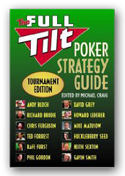 Chris Ferguson’s introduction to the game of Pot Limit Omaha is strongly grounded in mathematics and game theory, just what you’d expect from the computer science PhD. It’s a little light on tournament theory for a chapter in a tournament strategy guide, but it does a very good job of explaining how and why PLO must be played differently than big bet hold ’em games.
Chris Ferguson’s introduction to the game of Pot Limit Omaha is strongly grounded in mathematics and game theory, just what you’d expect from the computer science PhD. It’s a little light on tournament theory for a chapter in a tournament strategy guide, but it does a very good job of explaining how and why PLO must be played differently than big bet hold ’em games.
The central difference between the two games, of course, is that in Omaha everyone gets two more hole cards. As Ferguson explains, however, this actually translates into five more two-card combinations for each player in Omaha. He goes on to explain how this difference should affect your pre-flop hand selection and your post-flop play. You should play your hands straight-forwardly, betting hard even with your monsters since drawing hands may have many outs and rarely bluffing since your opponents will connect with the board more often. And following from that, your position becomes more important, since you have more information to gain from your opponents’ actions.
Ferguson addresses all of these concepts in more depth when he moves into the nuts and bolts of post-flop play. His theoretical approach to post-flop play is captured well when he says, “I like playing in a way that minimizes the number of difficult decisions I have to make, and maximize the number of difficult decisions my opponents have to make.”
This is the sort of vague poker advice that can be either right or wrong depending on how it is interpreted, and in fact Ferguson finds himself on both sides of the line at various times. Avoid reverse implied odds situations where you are likely to get outplayed or to find yourself with no good options is important, but sometimes the easiest decisions isn’t the most profitable one. After all, good players profit by making better decisions than their opponents.
For example, Ferguson describes situations “where I am confident I am ahead but I won’t know if I’m ahead after the turn” and suggests that he likes to get as much money as he can in on the flop in these spots. Against tricky opponents, that’s wise, but as he points out, many people play very straightforwardly in PLO. It’s hard to say for sure, because he doesn’t give a specific example of such a situation, but particurly when in position, he might be better off keeping the pot smaller on the flop and relying on his hand-reading skill to make a good decision on a future street.
He returns to this discussion when in the section “Playing the Turn and River”, suggesting that, “If you have one of those hands where you don’t know if you are ahead or behind, you might want to try betting out on the turn. Especially if this pot commits you, betting eliminates your opponent’s positional advantage and puts him to a tough decision.” I fail to see how this results in a tough decision for your opponent: most likely, he’ll fold his worse hands and call or raise with his better ones, particularly if you make a pot committing bet. Even if it does result in a more difficult decision for you, checking and calling (or making a read if the turn checks through), ought to be more profitable.
At other times, Ferguson’s advice seems to contradict his “keep it simple stupid” mentality when such thinking really does make sense. For instance, he argues that because hand values aren’t sharply divergent pre-flop, “you should usually call a raise and see the flop when you are in the big blind.” Deliberately playing a lot of marginal hands out of position for the sake of immediate pre-flop pot odds seems like just the sort of thing one ought to be avoiding, particularly when stacks are deep.
Oddly, in the “Tournament Strategy” section (which gets a mere two and a half pages in a thirty page article), he seems to argue just the opposite, that when on the bubble “You lose very little value by folding marginal hands because a lot of hands are close in value.” It seems backwards to me that you would make more marginal calls out of position with deep money than you would when stacks are shallow simply to avoid bubbling.
Aside from these caveats, Ferguson’s chapter is a comprehensive and reliable introduction to the game of Pot Limit Omaha. There are so many unique situations that can arise in PLO hat writing a practical guide in the form of a book chapter is a real challenge, but he does a good job of focusing on the strategic considerations that ought to guide you while also examining a fair number of common and tricky situations in detail. The result is a piece that makes PLO both comprehensible and enticing to a NLHE player looking for a change of pace.
